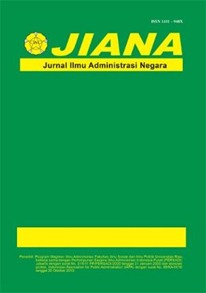EVALUASI PROGRAM PEMBINAAN, PELATIHAN GELANDANGAN DAN PENGEMIS
DOI:
https://doi.org/10.46730/jiana.v17i1.7876Keywords:
evaluation, program, training coaching, homeless, beggarsAbstract
Development Program Evaluation, Vagrant Training and Beggars. The purpose of this study was to determine the evaluation of homeless and beggar training training programs in Pekanbaru City as well as what factors influence the evaluation of homeless and beggar training training programs in Pekanbaru City. This study uses approach, observation and documentation. Qualitative descriptive research method. Primary data is obtained directly through interviews, research informants namely the Head of Social Rehabilitation Division, Head of the Secretariat / Responsible Division of Salter, Salter employees, and the community. Data analysis uses interactive methods ranging from data reduction, data presentation and conclusion drawing. The results of this study indicate that the implementation of the Evalution of the implementation of training programs for homeless and beggar training in the city of Pekanbaru has not yet achieved the expected results, in which the implementation of social welfare goals is sprawl.
References
Dun, William N. 2003, Pengantar Analisis Kebijakan Publik, Yogyakarta, Gadjah Mada University Press.
Meter dan Horn, 1975, The Policy Implementation Process : A Conseptual Framework, Administration and Society.
Nugroho, D Riant. 2003. Kebijakan Publik fomulasi, Impelementasi, dan Evaluasi. Jakarta : Gramedia.
Subarsono AG, 2005, Analisis Kebijakan Publik, Yogyakarta, Pustaka Pelajar
Wahab. Abdul. Solichin, 2001, Analisis Kebijaksanaan dari Formulasi ke Implementasi Kebjaksanaan Negara, Jakarta, Bumi Aksara.
Winarno, Budi, 2005 Teori dan Proses Kebijakan Publik, Yogyakarta; Media Pressindo.
Downloads
Published
How to Cite
Issue
Section
License
The copyright of the received article shall be assigned to the journal as the publisher of the journal. The intended copyright includes the right to publish the article in various forms (including reprints). The journal maintains the publishing rights to the published articles.
Authors are permitted to disseminate published articles by sharing the link/DOI of the article at the journal. Authors are allowed to use their articles for any legal purposes deemed necessary without written permission from the journal with an acknowledgment of initial publication to this journal.

Jurnal Ilmu Administrasi Publik is licensed under a Creative Commons Attribution-NonCommercial-ShareAlike 4.0 International License.




